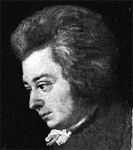
The Austrian Alpine retreat of Salzburg held a birthday bash on January 27 to celebrate the 250th birthday of the city's most famous son Wolfgang Amadeus Mozart. It wasn't the only show in town. Europe's business, political and cultural elite also were in town but not to party but rather to mourn the falling fortunes of Europe's bureaucratic behemoth, the European Union.
These are dark days for the EU bureaucrats. Last year, the French -- rah-rah backers of the EU project -- said Non! to a draft EU 'constitution' along with voters in Holland. Eurosceptics, mostly based in Britain but growing, said it was time to stick a fork in the constitution which wasn't really such, but would have streamlined the workings of the EU and, maybe, just maybe, gave Brussels more muscle in foreign affairs, dragging Europe out of Washington's shadow.
French Prime Minister Dominique de Villepin struck a flat note at the "Sound of Europe" confab in Salzburg, warning the EU is losing its legitimacy in the eyes of the European public by expanding too fast and opening membership talks with Turkey.
Europeans like to treat the EU as their whipping boy, blaming it for all that ills the continent, be it true or not. And more see the EU as nothing more than a Trojan Horse for advancing a neoliberal agenda, putting at risk the continent's social welfare model. Taking in ten mainly former Soviet bloc countries in 2004, expanding the EU to 25, has sparked fears in western Europe that their well-paid jobs will move further east, not to faraway Asia, but to new members like Poland, Slovakia, and Hungary. Even cheaper workers will join the club when the EU nets snag Bulgaria and Romania in 2008.
For the most part, the fears are legit, just ask the 1,700 workers at an AEG home appliance factory in the southern Germany city of Nuremburg. Electrolux, the parent company of AEG, announced in January it will shut the plant and move production to Poland and Italy where wages are a fraction of those in Germany. The workers did stage a strike, but not to save their jobs, rather to salvage decent severance packages, according to IG Metall trade union which represents them.
Further afield in Asia, however, the dogs of globalization are barking as well. Fears of losing jobs to cheaper Asian competitors sparked a continent-wide 24-hour strike by Europe's 50,000 dockworkers on January 16, shutting down ports in Hamburg, Rotterdam and Antwerp among others. They were protesting a EU plan to liberalize cargo handling, which its backers said would offer the usual neo-liberal recipe of more efficiency and competition at lower cost. In the French city of Strasbourg, thousands of stevedores clashed with riot police -- 64 of whom suffered injuries -- outside the European parliament where EU lawmakers debated and eventually defeated the dock liberalization measure, a slight setback for the EU's pro-business agenda.
Many Europeans feel the EU does the bidding of business rather than attend to the needs of everyday folk, if findings of a recent Eurobarometer opinion poll are to be believed.
Even the wealthy Austrians are down on the EU. Only 32 percent of the country's of those polled considers Europe a good thing, compared with 46 percent a year ago, making it the most euro-skeptic of the EU's 25 member states. Their ethnic kin in Germany aren't any more optimistic. They blame the EU for their country's economic and social problems. A stunning 84 percent of those polled fear that German jobs are likely to be lost to EU countries where labor cost are lower.
The Germans fear taking in either Turkey or maybe Ukraine will lead to an economic crisis. And while they don't blame the EU, Germans see EU membership as "part of the negative development" making German life less agreeable.
Turkish membership is the latest push-button issue to turn many off to the EU project. Most Europeans don't want Muslim Turkey in their club, and point out only a morsel of its territory lies within "Europe".
If things weren't bad enough, Frits Bolkestein, the former EU Commissioner for the internal market, said that the EU's new single currency, the euro, may not survive in the long term. Bolkestein warned that the euro would face a dramatic test in about ten years time when the pension crisis hits Europe "ruthlessly," with a swelling number of baby-boomers reaching retirement while too few young workers are available to pay the taxes needed to service the pensions.
Important states like Italy, the third largest economy in the Eurozone, are wholly unprepared for this crisis, Bolkestein warned.
A nightmare scenario is predicted for Germany which now has the world's highest proportion of childless women. The statistics, collected by the EU in 2005, found that thirty per cent of German women have not had children, and women graduates were even less likely to breed, with 40 percent of them having no children.
Not to be outdone in the doom-and-gloom department, another former Commissioner, Austria's Franz Fischler, has warned the EU risked becoming "the first empire in history to go down before it was founded."
Is it time to strike up Mozart's Requiem?



